Classes | |
| struct | actor_member |
| struct | actor_vtable_visitor |
| struct | add |
| struct | add_eq |
| class | any_api |
| class | appender_factory_impl |
| class | average_rate_meter |
| class | buffered_istream_impl |
| class | buffered_ostream_impl |
| class | callback_functor |
| class | callback_functor< void(Args...)> |
| struct | extract_op |
| class | gntp_icon_impl |
| class | gntp_notifier_impl |
| struct | insert_op |
| struct | is_operation_shorter |
| class | log_context_impl |
| class | log_message_impl |
| class | mmap_struct_base |
| class | ntp_impl |
| class | path_wrapper |
| class | pke_impl |
| class | rate_limited_operation |
| class | rate_limited_tcp_read_operation |
| class | rate_limited_tcp_write_operation |
| class | rate_limiting_group_impl |
| struct | sub |
| struct | sub_eq |
| struct | supports_allocator |
| class | url_impl |
Typedefs | |
| using | unique_file = std::unique_ptr<FILE, decltype( &fclose )> |
Functions | |
| template<template< typename... > class Set, typename T , typename... U> | |
| void | to_variant_from_set (const Set< T, U... > &s, fc::variant &vo) |
| template<template< typename... > class Set, typename T , typename... U> | |
| void | from_variant_to_set (const fc::variant &v, Set< T, U... > &s) |
| template<template< typename... > class Set, typename T , typename... U> | |
| void | from_variant_to_flat_set (const fc::variant &v, Set< T, U... > &s) |
| template<template< typename... > class Map, typename K , typename V , typename... U> | |
| void | to_variant_from_map (const Map< K, V, U... > &m, fc::variant &vo) |
| template<template< typename... > class Map, typename K , typename V , typename... U> | |
| void | from_variant_to_map (const variant &v, Map< K, V, U... > &m) |
| template<template< typename... > class Map, typename K , typename V , typename... U> | |
| void | from_variant_to_flat_map (const variant &v, Map< K, V, U... > &m) |
| NO_RETURN void | throw_datastream_range_error (const char *file, size_t len, int64_t over) |
| template<typename R , typename Arg0 , typename ... Args> | |
| std::function< R(Args...)> | bind_first_arg (const std::function< R(Arg0, Args...)> &f, Arg0 a0) |
| template<typename R > | |
| R | call_generic (const std::function< R()> &f, variants::const_iterator a0, variants::const_iterator e) |
| template<typename R , typename Arg0 , typename ... Args> | |
| R | call_generic (const std::function< R(Arg0, Args...)> &f, variants::const_iterator a0, variants::const_iterator e) |
| template<typename R , typename ... Args> | |
| std::function< variant(const fc::variants &)> | to_generic (const std::function< R(Args...)> &f) |
| template<typename ... Args> | |
| std::function< variant(const fc::variants &)> | to_generic (const std::function< void(Args...)> &f) |
| template<typename T > | |
| fc::true_type | is_class_helper (void(T::*)()) |
| template<typename T , typename A , typename... Args> | |
| auto | construct_maybe_with_allocator (A &&allocator, Args &&... args) -> std::enable_if_t< supports_allocator< T, A >::value &&supports_allocator< T, A >::leading_allocator, T > |
| template<typename T , typename A , typename... Args> | |
| auto | maybe_augment_constructor_arguments_with_allocator (A &&allocator, std::tuple< Args &&... > args, std::enable_if_t< supports_allocator< T, A >::value &&supports_allocator< T, A >::leading_allocator, int >=0) |
| template<typename T , typename A , typename... Args> | |
| auto | maybe_augment_constructor_arguments_with_allocator (A &&allocator, std::tuple<>, std::enable_if_t< supports_allocator< T, A >::value &&supports_allocator< T, A >::leading_allocator, int >=0) |
| template<typename T , typename A , typename... Args> | |
| auto | maybe_augment_constructor_arguments_with_allocator (A &&allocator, std::tuple< Args &&... > args, std::enable_if_t< supports_allocator< T, A >::value &&!supports_allocator< T, A >::leading_allocator, int >=0) |
| template<typename T , typename A , typename... Args> | |
| auto | maybe_augment_constructor_arguments_with_allocator (A &&allocator, std::tuple<>, std::enable_if_t< supports_allocator< T, A >::value &&!supports_allocator< T, A >::leading_allocator, int >=0) |
| template<typename T , typename A , typename... Args> | |
| auto | maybe_augment_constructor_arguments_with_allocator (A &&, std::tuple< Args &&... > args, std::enable_if_t<!supports_allocator< T, A >::value, int >=0) |
| template<typename T1 , typename T2 , typename A > | |
| std::pair< T1, T2 > | default_construct_pair_maybe_with_allocator (A &&allocator) |
| void | shift_l (const char *in, char *out, std::size_t n, unsigned int i) |
| void | shift_r (const char *in, char *out, std::size_t n, unsigned int i) |
| boost::asio::ip::udp::endpoint | to_asio_ep (const fc::ip::endpoint &e) |
Variables | |
| template<typename T > | |
| fc::false_type | is_class_helper (...) |
| bool | have_so_reuseport = true |
Typedef Documentation
◆ unique_file
| using fc::detail::unique_file = std::unique_ptr<FILE, decltype( &fclose )> |
Function Documentation
◆ bind_first_arg()
| std::function< R(Args...)> fc::detail::bind_first_arg | ( | const std::function< R(Arg0, Args...)> & | f, |
| Arg0 | a0 ) |
Definition at line 33 of file api_connection.hpp.

◆ call_generic() [1/2]
| R fc::detail::call_generic | ( | const std::function< R()> & | f, |
| variants::const_iterator | a0, | ||
| variants::const_iterator | e ) |
◆ call_generic() [2/2]
| R fc::detail::call_generic | ( | const std::function< R(Arg0, Args...)> & | f, |
| variants::const_iterator | a0, | ||
| variants::const_iterator | e ) |
Definition at line 44 of file api_connection.hpp.

◆ construct_maybe_with_allocator()
| auto fc::detail::construct_maybe_with_allocator | ( | A && | allocator, |
| Args &&... | args ) -> std::enable_if_t<supports_allocator<T, A>::value && supports_allocator<T, A>::leading_allocator, T> |
Definition at line 60 of file utility.hpp.
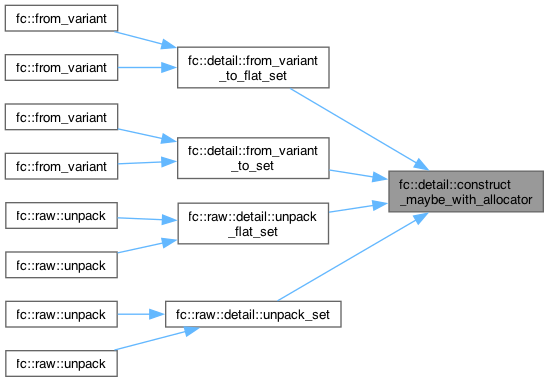
◆ default_construct_pair_maybe_with_allocator()
| std::pair< T1, T2 > fc::detail::default_construct_pair_maybe_with_allocator | ( | A && | allocator | ) |
Definition at line 124 of file utility.hpp.

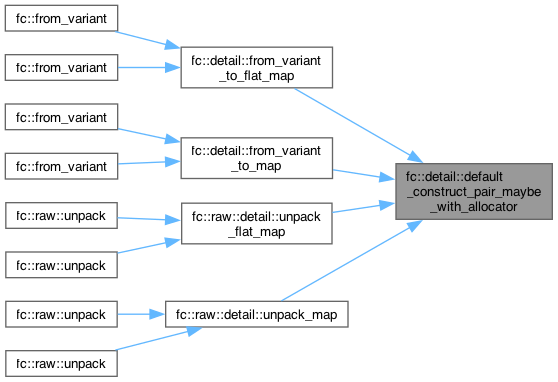
◆ from_variant_to_flat_map()
Definition at line 146 of file container_detail.hpp.


◆ from_variant_to_flat_set()
| void fc::detail::from_variant_to_flat_set | ( | const fc::variant & | v, |
| Set< T, U... > & | s ) |
Definition at line 110 of file container_detail.hpp.


◆ from_variant_to_map()
Definition at line 134 of file container_detail.hpp.


◆ from_variant_to_set()
| void fc::detail::from_variant_to_set | ( | const fc::variant & | v, |
| Set< T, U... > & | s ) |
Definition at line 98 of file container_detail.hpp.


◆ is_class_helper()
| fc::true_type fc::detail::is_class_helper | ( | void(T::* | )() | ) |
◆ maybe_augment_constructor_arguments_with_allocator() [1/5]
| auto fc::detail::maybe_augment_constructor_arguments_with_allocator | ( | A && | , |
| std::tuple< Args &&... > | args, | ||
| std::enable_if_t<!supports_allocator< T, A >::value, int > | = 0 ) |
Definition at line 116 of file utility.hpp.
◆ maybe_augment_constructor_arguments_with_allocator() [2/5]
| auto fc::detail::maybe_augment_constructor_arguments_with_allocator | ( | A && | allocator, |
| std::tuple< Args &&... > | args, | ||
| std::enable_if_t< supports_allocator< T, A >::value &&!supports_allocator< T, A >::leading_allocator, int > | = 0 ) |
Definition at line 98 of file utility.hpp.
◆ maybe_augment_constructor_arguments_with_allocator() [3/5]
| auto fc::detail::maybe_augment_constructor_arguments_with_allocator | ( | A && | allocator, |
| std::tuple< Args &&... > | args, | ||
| std::enable_if_t< supports_allocator< T, A >::value &&supports_allocator< T, A >::leading_allocator, int > | = 0 ) |
Definition at line 82 of file utility.hpp.
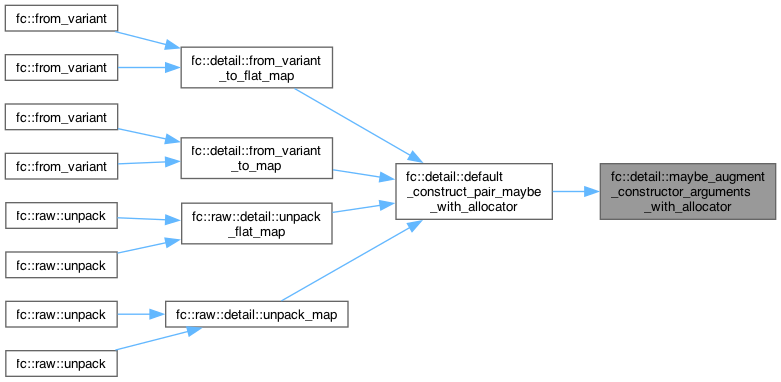
◆ maybe_augment_constructor_arguments_with_allocator() [4/5]
| auto fc::detail::maybe_augment_constructor_arguments_with_allocator | ( | A && | allocator, |
| std::tuple<> | , | ||
| std::enable_if_t< supports_allocator< T, A >::value &&!supports_allocator< T, A >::leading_allocator, int > | = 0 ) |
Definition at line 107 of file utility.hpp.
◆ maybe_augment_constructor_arguments_with_allocator() [5/5]
| auto fc::detail::maybe_augment_constructor_arguments_with_allocator | ( | A && | allocator, |
| std::tuple<> | , | ||
| std::enable_if_t< supports_allocator< T, A >::value &&supports_allocator< T, A >::leading_allocator, int > | = 0 ) |
Definition at line 90 of file utility.hpp.
◆ shift_l()
| void fc::detail::shift_l | ( | const char * | in, |
| char * | out, | ||
| std::size_t | n, | ||
| unsigned int | i ) |
Definition at line 14 of file _digest_common.cpp.
◆ shift_r()
| void fc::detail::shift_r | ( | const char * | in, |
| char * | out, | ||
| std::size_t | n, | ||
| unsigned int | i ) |
Definition at line 38 of file _digest_common.cpp.
◆ throw_datastream_range_error()
| NO_RETURN void fc::detail::throw_datastream_range_error | ( | const char * | file, |
| size_t | len, | ||
| int64_t | over ) |
Definition at line 4 of file datastream.cpp.
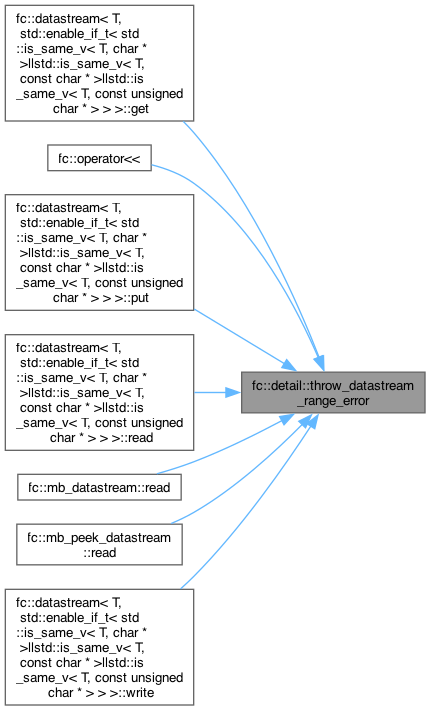
◆ to_asio_ep()
| boost::asio::ip::udp::endpoint fc::detail::to_asio_ep | ( | const fc::ip::endpoint & | e | ) |
Definition at line 23 of file gelf_appender.cpp.


◆ to_generic() [1/2]
| std::function< variant(const fc::variants &)> fc::detail::to_generic | ( | const std::function< R(Args...)> & | f | ) |
Definition at line 51 of file api_connection.hpp.


◆ to_generic() [2/2]
| std::function< variant(const fc::variants &)> fc::detail::to_generic | ( | const std::function< void(Args...)> & | f | ) |
Definition at line 59 of file api_connection.hpp.

◆ to_variant_from_map()
| void fc::detail::to_variant_from_map | ( | const Map< K, V, U... > & | m, |
| fc::variant & | vo ) |
Definition at line 123 of file container_detail.hpp.
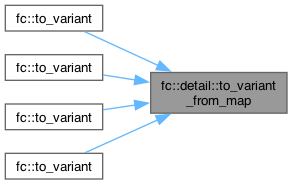
◆ to_variant_from_set()
| void fc::detail::to_variant_from_set | ( | const Set< T, U... > & | s, |
| fc::variant & | vo ) |
Definition at line 87 of file container_detail.hpp.
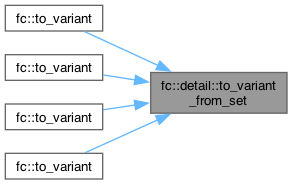
Variable Documentation
◆ have_so_reuseport
| bool fc::detail::have_so_reuseport = true |
Definition at line 19 of file tcp_socket.cpp.
◆ is_class_helper
| fc::false_type fc::detail::is_class_helper(...) | ( | ... | ) |
